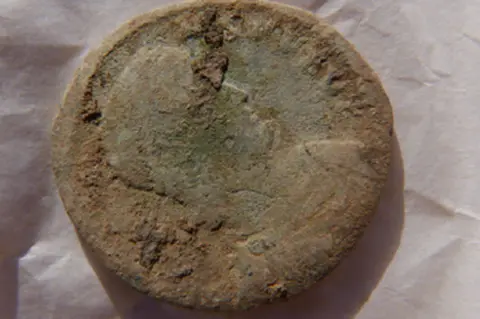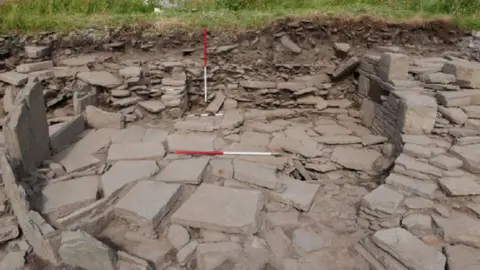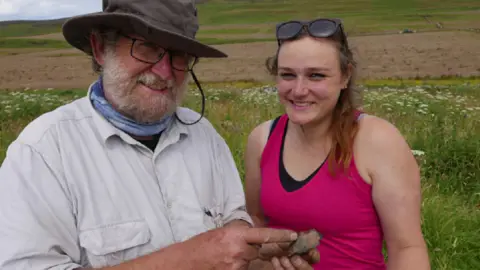Roman coin find in Orkney thrills archaeologists
 Swandro-Orkney Coastal Archaeology Trust
Swandro-Orkney Coastal Archaeology TrustArchaeologists are thrilled by the discovery of a Roman coin during the excavation of an archaeological site in Orkney.
The copper alloy coin was found at the Knowe of Swandro, the location of a Neolithic chambered tomb, Iron Age roundhouses and Pictish buildings.
The archaeological site is at risk from coastal erosion.
Roman finds have been made before in Orkney, and other Scottish islands including the Western Isles.
The coin found in the Knowe of Swandro dig on Rousay is believed to date from the mid 4th Century AD.
Archaeologists said the works of classical writers suggested the Romans were aware of Orkney, with the writers even making claims of an invasion, although archaeologists and historians believe this to have been unlikely.
The coin was found at the site of a small roundhouse.
Other finds from that site have been dated to about the second and fourth centuries AD.
 Swandro-Orkney Coastal Archaeology Trust
Swandro-Orkney Coastal Archaeology TrustThe Swandro-Orkney Coastal Archaeology Trust, which is leading the dig, describes itself as being in a "race against time and tide" to excavate and record the site.
Every winter fierce Atlantic gales erode more of the coastline.
The University of the Highlands and Islands and University of Bradford are among universities assisting with the archaeological work.
Dr Steve Dockerill, co-director of the project with Dr Julie Bond, said: "The bust on the coin is clearly visible although much of the lettering isn't at present clear.
"The reverse contains a standing figure, possibly representing the emperor with what might be an image of Victory at the side.
"This type of coin is similar to issues dating to the mid 4th Century AD."
 Swandro-Orkney Coastal Archaeology Trust
Swandro-Orkney Coastal Archaeology TrustArchaeologists involved in the dig have also been excited by evidence of iron working and copper alloy casting in a later Pictish building.
Leading archaeo-metallurgist, Dr Gerry McDonnell, has been assisting the Orkney team with identifying metal and other items from the debris.
The most recent piece of evidence is a fired clay tuyére - this is the clay used to hold bellows in a furnace.
Roman coins have been found in other parts of Scotland which the Romans did not occupy.
Copper alloy coins dating from the middle of the 4th Century were found in a sand dune in the Western Isles 10 years ago.
The location in the Uists has been kept secret to protect the site.
Just seven other Roman coins had previously been found on the isles.
A Roman brooch and pieces of pottery have also been uncovered in the past.
